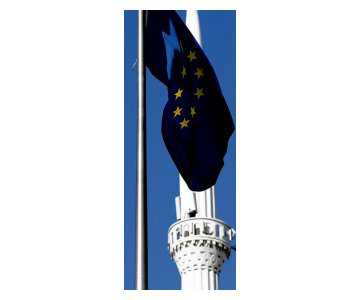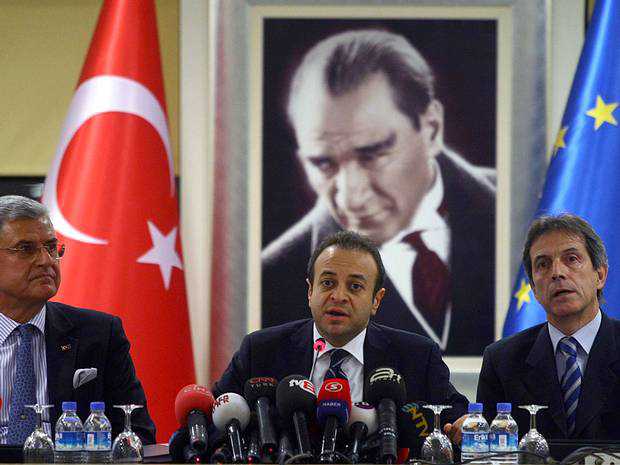Turkey’s ambitions to be among the top ten global economies by 2023 could mean that the rising star of the emerging market economies becomes “the China of Europe”, according to an economist and a prominent Turkish business woman.
Turkey’s economy was the fastest growing in Europe in 2011, growing 8.5 percent (the second fastest after China among major emerging market economies). But in 2012 Turkey, like China, experienced a slump in growth as the global economic slowdown adversely affected its exports and capital inflows.
After what has been seen as a “soft landing” for Turkey, growth is seen picking up in 2013 with the latest HSBC manufacturing PMI reaching a 14-month high in December as new orders and exports rebounded.
(Read More: A Decade-Long Ascent to Economic Power)
Indeed, while most of Europe struggles to achieve 1 percent growth, Turkey is expected to have 3.5 percent growth in 2013, the IMF said in recent forecasts.
But that’s not enough if Turkey wants to fulfil its economic ambitions, Guler Sabanci, chairman of Sabanci Holdings, one of the largest industrial and financial conglomerates in Turkey, told CNBC.
“Turkey needs minimum 6 percent growth,” the member of one of Turkey’s most prominent industrial dynasties, told CNBC Europe’s “Squawk Box.”
“We have these 2023 targets where we would like to be among the top ten economies in the world. In order to reach those targets we have to catch 6 percent average growth in the medium to long-term,” she said.
Lofty Goals?
The “2023 Vision” is the name of a series of goals that Turkish prime minister Recep Tayyip Erdogan envisages for his country in ten years, with ongoing economic, social and infrastructure improvements making up the Republic’s aims.
By 2023, Turkey aims to achieve a gross domestic product of $2 trillion from $775 billion in 2012. It also hopes to make social improvements to achieve a per capita income of $25,000 by 2023 and reduce unemployment to 5 percent.
In 2012, the per capita income was $10,524 and unemployment was 9.8 percent, according to the World Bank.
Turkey also hopes to have 30 million people in the workforce by 2023 from 22.3 million currently.
“There is a lot of room for growth,” Sabanci told CNBC. “2013 is an important year for Turkey, we’re having serious infrastructure investments and logistic investments, there are serious opportunities,” she added.
Turkey Must Concentrate
“It’s a domestic consumption story, but it does need to move on,” emerging market economist at Nomura, Peter Attard Montalto, told CNBC. “Like all emerging markets, that next progression is towards taking the wealth, building the infrastructure and continuing to progress. I think Turkey is at that point.”
Apart from the country’s economic ambitions, Turkey has also been compared with China because of the rise of demand for mobile technology, e-commerce and communications.
“It has a very big attraction among the young generation, all the internet and cellphone usage numbers are high,” Sabanci told CNBC.
(Read More: Big Opportunities in Turkey’s Digital Market)
As the gateway between Asia and Europe, domestic consumption and consumer trends in the secularised but nominally Muslim country have been increasingly influenced by its western neighbors over recent years.
Take for example the traditional Turkish alcoholic drink called Raki. Consumption of the national drink has fallen 50 percent in the last 13 years as consumers have diversified to Western alcoholic beverages. That’s been a huge opportunity for global brands, such as Unilever and Diageo (which acquired Turkey’s leading spirits company Mey Icki in 2011).
Turkey’s Journey to Europe
Turkey has been seeking membership to the European Union (EU) in the face of some tough opposition within Europe.
Sabanci said Turkey’s “journey to Europe” has been a 50-year one and accession discussions must continue. After becoming an associate member of the European Economic Community in 1963, Turkey has enjoyed good trade relations with its continental neighbor, Europe.
Talks over the country’s accession to the EU began in 2005 on the condition that Turkey embark on a series of economic and political reforms and a normalization of trade relations with Cyprus, which it has done.
However, talks were stymied by then-French president Nikolas Sarkozy who objected to Turkey becoming a full member or Europe, offering a “special partnership” instead.
Turkey refused the offer but has since gone through a rapprochement with the EU and has started negotiations again.
via Can Turkey Become ‘the China of Europe’?.






